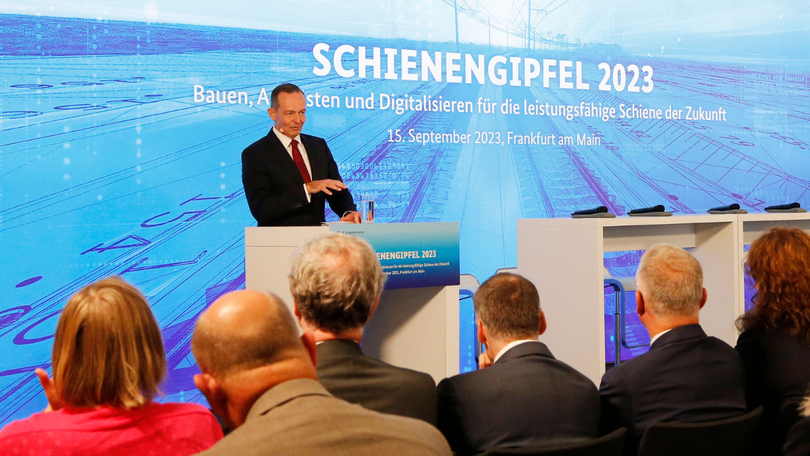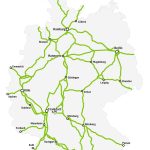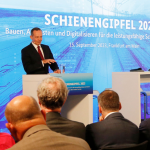 Germany’s Federal Minister Volker Wissing announced that the government will invest EUR 40 billion by 2027 under the rail renewal plan and digitalisation programme that will improve passenger and freight transport services while increase energy efficiency.
Germany’s Federal Minister Volker Wissing announced that the government will invest EUR 40 billion by 2027 under the rail renewal plan and digitalisation programme that will improve passenger and freight transport services while increase energy efficiency.
One-third of this investment will be provided in the form of a capital injection for Deutsche Bahn (DB) to be used for modernisation and expansion of country’s railway network.
This is the largest and most comprehensive infrastructure programme for the rail network and stations since the railway reform in 1994 and was unveiled by the Federal Ministry for Digital and Transport (BMDV) and Deutsche Bahn (DB) on September 15, 2023, in Frankfurt am Main, during the “Tag der Schiene 2023” (Rail Day 2023 in English) event.
The aim of the programme is to make train traffic more punctual in the long term and to create the conditions for achieving transport policy goals in passenger and freight transport.
The investment is available “despite the strained budget situation and is a clear commitment to rail. The rail infrastructure has been neglected for decades and pushed to its absolute limits. This is no longer acceptable and unworthy of a progressive economic nation. We need rail as it is the most climate-friendly mode of transport and it can only fulfill this task if it is again reliable, efficient and modern,” the minister said.
The Federal Ministry for Digital and Transport (BMDV) provides the funds required for investments in the rail infrastructure. In the draft budget for 2024 and the financial planning up to 2027, the BMDV’s individual plan earmarks an additional EUR 11.5 billion for railways. This is also made possible thanks to the income from the expanded truck toll. The climate and transformation fund will provide additional funds totalling EUR 12.5 billion also for railways, while Deutsche Bahn is also making its own contribution of EUR 3 billion. A further EUR 12.5 billion is to be made available through a further equity increase.
The minister explained that the “financial conditions have been created and the priorities have been set with high-performance corridors, the modernisation of train stations, digitalisation and the new construction and expansion of the infrastructure.”
“We are renewing and modernizing the infrastructure with a programme that is unprecedented in DB history. A big thank you goes to the federal government for its commitment to provide the necessary additional funds amounting to up to EUR 45 billion. It is now up to us to roll up our sleeves together with the construction industry,” Richard Lutz, CEO of DB said.
The investment package for rail renewal plan and digitalisation projects will boost the development of railway transport.
The plan is focused on the renovation and expansion of heavily used network totalling 9,000 km, DB says. The BMDV and railway sector identified the heavily used routes* that will be renovated by 2030 so that they can deliver the greatest benefit and quickly lead to noticeable improvements. 40 rail routes totalling 4,000 km will be renovated by 2030, in addition to the renewal of other lines, the modernisation of stations and digitalisation of the railway transport. The stations along the routes will also be modernised and upgraded.
The overhaul of the Mannheim Riedbahn – Frankfurt am Main route will start in 2024, followed by Emmerich – Oberhausen and Hamburg – Berlin/Spandau corridors in 2025. The high-performance corridors Cologne – Hagen and Nuremberg – Regensburg corridors will be renovated starting 2026. Thereafter, ambitious progress will be made until the renovation of the last of the 40 rail corridors, the Mannheim – Karlsruhe corridor, for which works will begin in 2030. The DB will also significantly upgrade 20 stations along the Riedbahn alone as part of the renovation works.
Another component of the strategy is to clear the investment backlog and upgrading the rail network as well to create additional capacity through new measures which includes additional switches, a denser signalling system to provide traffic stability, predictability and ensure better and more punctual train service.
Germany will continue the rail digitalisation programme rolling out the ETCS across the entire system delivering up to 30% more capacity on the existing network.
Two other goals are part of the new rail renewal plan and includes the targeted expansion and new construction of routes in order to resolve bottlenecks and thus make possible the Deutschlandtakt (Germany’s nationwide integrated regular interval timetable) as well as a large-scale modernisation and expansion programme for the train stations across the country. This will provide passengers with increased comfort and access to rail services along the high-performance corridors as well as on the other selected routes.
From January to the end of July, 70 million passengers travelled almost 22 billion-km on ICE and IC trains, “a historical record. Never before have passengers travelled more kilometers on long-distance transport in one six-month period,” the Minister Wissing said when presenting his budget plan to the Bundestag, on September 7, 2023.
*The federal government and DB, together with the railway industry have planned the renewal of the following routes:
2026:
- Hamburg–Hannover (subject to further decisions)
- Hagen–Wuppertal–Köln
- Troisdorf–Koblenz
- Koblenz–Wiesbaden
- Nürnberg–Regensburg
- Obertraubling–Passau
2027:
- Lübeck–Hamburg
- Bremerhaven–Bremen
- Lehrte–Berlin
- Hamm–Düsseldorf–Köln
- Frankfurt/Main–Heidelberg
- München–Rosenheim
- Rosenheim–Salzburg
2028:
- Bremen–Hamburg
- Nordstemmen–Göttingen
- Uelzen–Stendal
- Stendal–Magdeburg
- Hagen–Unna–Hamm
- Köln–Bonn–Koblenz
- Koblenz–Mainz
- Bebra–Fulda
- Würzburg–Nürnberg
2029:
- Hamburg–Hannover (subject to further decisions)
- Bremen/Rothenburg–Wunstorf
- Lehrte–Groß-Gleidingen
- Bebra–Erfurt
- Aachen–Köln
- Forbach–Ludwigshafen
- Stuttgart–Ulm (former route)
2030:
- Bremen–Osnabrück
- Osnabrück–Münster
- Münster–Recklinghausen
- Minden–Wunstorf
- Weddel–Magdeburg
- Kassel–Friedberg
- Würzburg–Ansbach–Treuchtlingen
- Mannheim–Karlsruhe
- Ulm–Augsburg
Share on:






